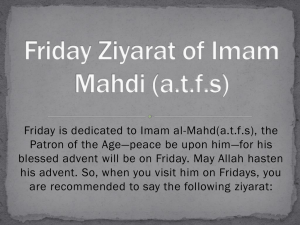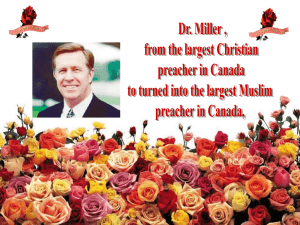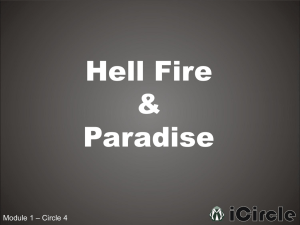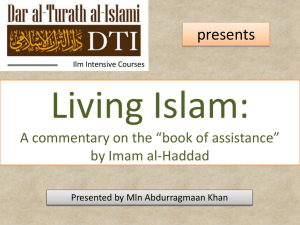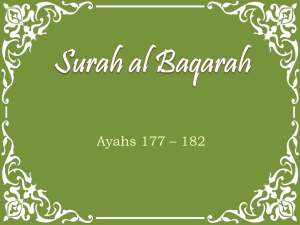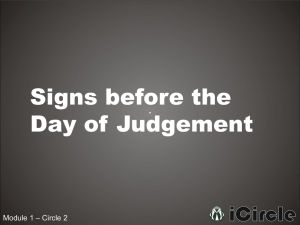Achievement Standard- Islam section
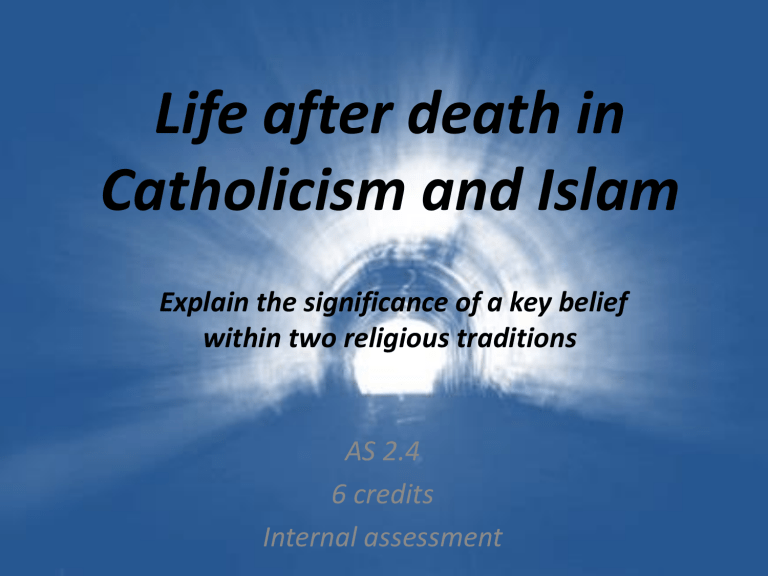
Life after death in
Catholicism and Islam
Explain the significance of a key belief within two religious traditions
AS 2.4
6 credits
Internal assessment
Revision
What are some of the main beliefs behind life after death in Christianity?
Where are these beliefs gathered from?
What do Muslims believe happens after humans die?
1) Body and soul separate
2) There is an initial judgement by two angels Munkar and Nakir
• Nakir and Munkar prop the deceased soul upright in the grave and ask three questions: "Who is your Lord? Who is your Prophet?
What is your religion?".
• If the deceased answers correctly, the time spent awaiting the resurrection is pleasant. If one answers their questions incorrectly, one is beaten every day, other than Friday, until Allah gives permission for the beating to stop.
• These two jet-black angels with blue eyes have a shoulder span measured in miles, and carry hammers "so large, that if all of mankind tried at once to move them a single inch, they would fail". When they speak, tongues of fire come from their mouths. http://www.oocities.org/khola_mon/myth/Mythic.html
Interesting Stuff…
Some of the torture within the grave may include:
• the harmful insects of the Earth will eat the dead bodies.
• the Earth will close in on the dead bodies.
• their graves will become like ditches of Hell.
• ninety-nine poisonous dragons bite a non-Muslim in his grave; the dragons breathing air will destroy all vegetation on earth
• ninety-nine serpents will be biting him and each serpent will have seven heads. This will continue up to the
Resurrection Day.
Interesting Stuff
The enjoyment for believers in the grave may include:
• their graves to be lit up like the light of a full moon.
• their graves to be widened seventy (70) cubits by
(70) cubits. ( 45.0 cm or 18 inches (1.50 ft)
* The prophets, martyrs, and children are exempted from the questioning in the grave *
After death cont’d
3) A final judgement by Allah on the day of
Judgement
4)Day of resurrection
5)Taken to the garden of paradise or fiery hell
Bar-what? Barzakh
• Sequence that happens after death, in which the soul will separate from the body.
Three events make up Barzakh:
• The separation of the soul and the body, in which the soul separates and hovers over the body.
• Self-review of one's actions and deeds in one's life.
• The soul rests in an interspace in which one will experience a manifestation of one's soul resulting in a cold sleep state, awaiting the Day of Judgement.
• Clip up to 3:05
General beliefs in after life
Islam/ Christianity
Similarities : Both believe in the separation of the soul after death
??
??
??
Differences: In Islam, angels of Munkar and Nakir come to determine the status of your soul until the day of Resurrection
??
What is the Shahadah?
• One of the five pillars of Islam
• Declaration of faith
‘I witness that there is no other god but Allah, and
Muhammad is the prophet of Allah.’
These words are spoken into the ear of a newborn baby. When a Muslim is dying, they are the last words which he or she will say
What does it say about life after death?
• It implies that there is life after death
• Allah controls ALL aspects of life and death
What is the Quran?
• Muslims believe that the Quran was verbally revealed through the angel Gabriel from Allah to Muhammad over a period of twenty three years. (610-632 Common Era)
• Muslims hold the Quran as the proof of
Muhammad’s prophecy
• Consists of 114 Chapters, each known as a sura.
What does it say about life after death?
• There will be a day of judgement (Yawm ad-Din)
• There will be a day of resurrection (Yawm al-
Qiyamah)
• The good will go to ‘paradise’ (Jannah)
• The bad will go to hell (Jahannam)
• A belief in the resurrection
(Qayaamah)
What are the similarities between the
Bible and Quran?
• Are the most important doctrine to their given religion
• Outline ideas of life after death which shape structural beliefs on LAD
• Both discuss the idea of resurrection
• Both speak of a judgement day
• Both talk about the idea of a heaven and hell
Good Q: Who controls hell?
• Gate of hell is guarded by Maalik who is the leader of the angels assigned as the guards of hell also known an Zabaaniyah
• Description of Maalik in the hadith (narration of the words and deeds of Muhammad) is of a repulsive scary looking man surrounded by fire, who never laughs
What is Akhirah?
• The day of Judgement by Allah after death
• It is the afterlife or everlasting life
• The Islamic day of judgement
• Allah's final assessment of humanity
• 'last judgment' is referred to many times in the
Quran and has many names.
"the Day of Reckoning"
"the Hour“
"the Last Day"
"Day of Judgment"
"Day of the Reckoning"
Judgement Day
• Fixed is the Day of Judgement. On that day the
Trumpet shall sound and you shall come in multitudes.
The gates of heaven shall swing open and the mountains shall pass away and become like vapour. Hell will lie in ambush, a home for the transgressors. There they shall abide long ages; there they shall taste neither refreshment nor any drunk, save boiling water and decaying filth: a fitting recompense…As for the righteous, they shall surely triumph, Theirs shall be gardens and vineyards, and high-bosomed maidens for companions: a truly overflowing cup. (78:16)
• Read through p.5 as a class…..
Jannah (Paradise/
Heaven)
• The Good go straight to paradise
• Eternal peace, happiness and delight
• Heaven is symbolised by a green garden full of flowers, foliage, singing birds and water
Quran Description…
Jahannam (Hell)
• Place of torment and fire
• The wicked will suffer forever
• Cross pit of hell into paradise using Sirat bridge. Difficult to cross - thin as a razor.
• The Quran states the punishments will be: the burning of skin, only to be replaced for reburning; garments of fire will be worn, and boiling water will scald the skin and internal organs; faces on fire; lips burnt off; backs on fire, roasting from side to side; faces dragged along fire; bound in yokes then dragged through boiling water and fire.
• The sunnah mentions the majority of hell's inhabitants being women who were ungrateful to their husbands; that the leastsuffering person in hell will have their brain boiling from standing on hot embers;
• Video Clip….
So…. Why is life after death important?
• It is the purpose for life – the good will have eternal life, the bad eternal damnation
• Each person will be judged
• A persons life will be judged on how they follow the five pillars
Shahada- profession of faith
Salat-prayers
Sawm- fasting
Zak ā t-armsgiving
Hajj-pilgrimage
How do Muslims show this importance?
• Rituals for death
- 3 day mourning period
- 7, 40, 100 day observances may occur with recitations from the Quran
-visit cemeteries Mon, Thurs, Fridays before prayer, Saturday up to sunrise
• Respect for the dead body
- bathing and cleansing the body
- Body wrapped in a plain cloth (kafan) to respect dignity of the deceased
• Prayers for the dead
- Salatul Janazah the
Islamic funeral prayers demonstrating a belief in life after death
1. Funeral prayers are said over the body at the time of death and during preparation of the body
(Salatul Janazah – prayers after the wrapping of the body)
2. Prayers are said at the funeral
(prayer is led by the Imaam (male prayer leader)
3. Parts of the Quran are recited
4. Mourners silently think of their intentions
5. First four Takbir are said aloud – Takbir is the phrase for
All ā hu Akbar meaning “God is Great”
6. Opening chapter of the Quran read silently
7. Imaam says the second Takbir followed by mourners praying silently
8. Finally the Imaam recites the final Takbir and then asks the higher power to provide peace for the deceased
Islamic Funerals
1. Enshrouding the Deceased
2. Funeral prayer – encorporates four Takbir, the name for the phrase Allahu Akbar meaning “God is Great”
- there is no Ruku' (bowing) and Sujud (prostrating- forehead, nose, both hands, knees and all toes touching the ground together)
3. Burial -grave aligned perpendicular to Mecca
-The body is placed in the grave without a casket, laying on its right side, and facing Mecca.
4. Mourning – 3 day mourning period, widows 4 months and 10 days
5. Directives for Widowsmust wait four lunar months and ten days, after the death of their husbands before re-marriage.
-Husbands must leave a will for the wife as when a man dies she has no income.
Funeral Clip
Widows
• “ And those of you who die and leave widows behind, they should keep themselves in waiting for four months and ten days. Then when they have fulfilled their term, there is no blame on you about what they do with themselves in accordance with the norms [of society]. And Allah is well acquainted with what you do. And there is also no blame on you if you tacitly send a marriage proposal to these women or hold it in your hearts. Allah knows that you would definitely talk to them. [Do so] but do not make a secret contract. Of course you can say something in accordance with the norms
[of the society]. And do not decide to marry until the law reaches its term. And know that Allah has knowledge of what is in your hearts; so be fearful of Him and know that Allah is
Most forgiving and Most Forbearing.
What rituals happen in an Islamic funeral demonstrating belief in life after death?
• Body is completely cleansed and washed with water as prescribed in the Sunnah
• Washed by family and relatives
• Wrapped in a shroud (kafan)
• Funeral procession
• Men say funeral prayers in the presence of the body usually in a mosque
• Male family members are responsible for the lowering, alignment and propping of the deceased in the grave (The lowering of the corpse, and positioning of the soil-balls (head, chin, shoulder)is done by the next of kin. In the case of a departed husband, the male brother or brother-in-law usually performs this task.)
• After burial a collective prayer for the dead is said



